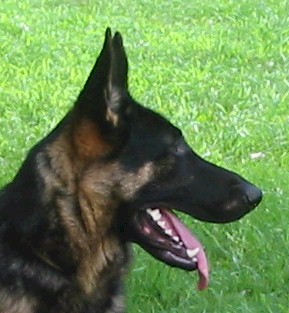How to Choose
a Dog for Protection Training
What Breed is Best?
Any breed of dog can
be suitable for protection training. So a mixed breed could be better
than some purebred German Shepherd Dogs. Although this can be true, one
will find a higher number of dogs that have the proper temperament for
protection training from the breeds that have been selectively bred for
this purpose.
The most notable are
the German Shepherd Dog, Rottweiler, Belgian Malinois and Dutch
Shepherd. There are other dogs a person may consider for protection
training such as the Doberman Pinscher, Bouvier Des Flandres, Airedale, or Australian Cattle Dog.
Out of these a German
Shepherd Dog is probably the best choice for the average person looking
to select a protection dog.
Breeds other than the
German Shepherd Dog have their strong points, so they should not be over
looked, however you need to be aware of your own needs, your strengths
and weaknesses, and your dog handling experience, as well as the
particular breeds good and bad points.
For protection
training it is more important how the individual dog reacts to stress,
than what breed the dog is.
Male or Female?
Males tend to be larger than females as well as be a little
more confident and self assured. It's my opinion that females tend
to bark a little more than males. You can compare the temperament
of GSD to that of humans. If a wife gets up in the middle of the
night and sees a car parked at the end of the driveway with its lights
off, she immediately starts screaming for her husband to get up and "see
what is going on". If a husband gets up, he may or may not alert
his wife right away. Same is true in the Shepherd world. The
males are usually more quiet with a "I can take care of this" attitude.
Puppy or Adult?
People often ask me , whether they should get a puppy or an adult dog,
for protection training? My answer is that getting a puppy is more of a
gamble than getting an adult dog. However, testing a puppy and working
with a reputable breeder, who knows what you are looking for, will
increase the chances of getting a puppy that can develop into a dog,
with the mental characteristics necessary to do protection training.
The other issue is that it's difficult to know if a puppy will develop
structural problems, such as hip or elbow problems. It is wise to make
sure that the puppy's parents have been checked for possible genetic
structural problems.
With an adult dog, what you see is what you get
= You know exactly what you are buying.
Puppies, however, are better bonded to you and socialized to your lifestyle.
One of the drawbacks to getting an adult dog, is that you will not get
to bond with the dog through it's critical socialization period (up to
16 weeks). A potential difficulty also associated with acquiring an adult dog is not being
able to socialize the dog to your lifestyle. This could include teaching
the dog to live with cats and other pets, or socializing the dog and
training it to respond to family members, who may have trouble
controlling an outgoing dog.
Another area that can
be a disadvantage to getting an adult dog, is if you are going to use
the dog for a highly specialized type of training. It is likely
that an adult dog has already had some training, and it could be that
this training may conflict with the training program that will make the
dog deployable. In this case, it may still be better to acquire an adult
dog, with the understanding that it may be necessary to drop the dog
from a training program and start with a new dog.
To help prevent this
type of set back, any predictable problem areas should be tested for. It
should also be understood that a puppy will probably not be deployable
until it is about one and a half years (18 months) old. If you need a
trained dog fairly soon, it's probably best to go with an adult dog.
You will have a
better chance of getting a puppy that can do protection, if you get it
from a breeder, that is breeding for those characteristics. The
puppies genetic history, can be an important factor in selecting the
right pup.
Many of the
protection dog "sports" (KNVP, Schutzhund,
etc.) can be thought of as temperament tests for breeding stock.
With this in mind, you may want to look for a pup with titled parents.
Even though the parents are titled, does not mean the puppy will be a
good protection dog when it grows up, or even that the parents deserve
the titles they possess. However if the parents possess the proper make
up for protection, it is more likely that the pup will too.
